Matthew Dicks's Blog, page 29
February 7, 2025
Jump scares marketed properly
Introducing TabBoo…
A Chrome extension designed to add random jumpscares to websites you’re trying to avoid.
In the words of TabBoo’s marketing:
“You’re stuck in an addictive, endless loop, loading the same sites over and over again. Install the extension and let aversive conditioning do the rest.”
I don’t like this much. Websites aren’t like nicotine, heroin, or doomscrolling. If you don’t want to visit Pinterest, Temu, or Club Penguin, don’t.
Besides, TabBoo is too easy to turn off. It’s not like you’re adding a permanent jump scare to the website. With two clicks, it goes away, and you’re staring at some Pinterest board of pet shenanigans or ’90s nostalgia again.
But this browser extension has an outstanding use that the company should absolutely lean into:
Trickery, tomfoolery, and pranking.
I’d love to add this extension to the browsers of friends and colleagues, adding jump scares to some of their most commonly visited websites.
Surreptitiously add this Chrome extension to your pal’s browser, ensuring it isn’t one of the extensions visible in the address bar. Then, wait for that person to visit their favorite sports, news, or shopping website.
With luck, they may never figure out what’s going on, dooming them to a lifetime of shock and fear.
Now that is something I can get behind, and more importantly, it’s what TabBoo should be marketing immediately.

February 6, 2025
Sad bananas
Bananas are sold in bunches, but when a banana falls off the bunch before it hits grocery store shelves, the grocer has a problem:
People don’t like buying single bananas when there are perfectly good bunches beside them.
The result is a lot of wasted bananas and lost profits.
But good news!
These lonely bananas have the potential to find a good home with the right messaging.
Researchers made three different signs to hang up above crates of single bananas:
One was a picture of a sad banana saying, “We are sad single bananas who want to be bought as well.”One was a picture of a happy banana saying, “We are happy single bananas who want to be bought as well.”A third sign read, “Here are single bananas that want to be bought as well.”The results?
Shoppers were far more likely to buy a single banana when the image of the sad banana was used.
Of course, as a storyteller and someone who works with companies every day to increase sales, improve messaging, and motivate consumers, I could’ve easily predicted the results of this experiment.
The sad banana sign — unlike the other two signs — is a story containing stakes:
A lonely, depressed banana in need of a home. Tears in its eyes. Yearning for a place of its own.
It’s a story as old as time.
It also emotionally connects with consumers who understand the pain and grief associated with loneliness and exclusion. The sad face makes that connection possible, whereas a happy-faced banana saying the same thing lacks the inherent need for concern or empathy.
In some ways, the happy banana claiming to be “a happy single” is incongruous, illogical, and maybe even monstrous — the serial killer of bananas.
Even using the word “who” instead of “that” in the text helps to personify the banana. The sign could just as easily have read:
“We are sad single bananas that also want to be bought.”
But switch “that” to “who,” and it converts an object to something with a soul.
We use “that” to speak about things. We see “who” to speak about living, sentient beings.
This is the beauty of storytelling:
A few simple words — chosen well and attached to a simple image — can reduce waste, increase profits, and find a happy home for a wayward piece of fruit.
All at almost no cost to the grocer.

February 5, 2025
Quitters never win
Charlie has launched a YouTube channel called Rails Across New England, charting his new obsession with rail fanning:
Watching and recording trains as they pass by stations and crossings.
Also learning about the intricacies of America’s railway system. Buying and building model train sets. Deep diving into different types of engines, cars, stations., etc.
His YouTube channel currently has 66 followers.
“It’s not a lot,” he told me. “But it’s better than none.”
He’s recently started doing YouTube Lives on his channel. After his most recent live broadcast, he said, “I had exactly zero people watching tonight, but that’s okay. I’m doing it. I’m making stuff, even if no one is watching.”
I love that kid.
He understands that things almost always suck at first, and they will likely suck for a long time.
So many people — almost everyone — quit when success does not come easily to them. In the face of overwhelming odds and daily disappointments, they surrender their dreams and resign themselves to a lifetime of regret.
Molly Shannon’s first pitch tape to SNL was watched and passed over. While reflecting on that time, she said her thoughts were this:
“That’s okay. I’ll keep honing my craft, and maybe in five years, SNL will give me another chance.”
For five years, Shannon hosted a show in New York City, cultivating a list of people she would constantly call, email, and beg to attend. She paid for the band and theater out of pocket and made almost no money in the process.
Five years later, SNL gave her a second look. They asked for her to submit another video. Instead, she insisted the producer attend one of her shows, which — after five years of grinding, suffering, and honing her craft — was extraordinary.
The producer reluctantly agreed.
The rest is history.
FIVE YEARS.
She worked like hell for five years before making her dream come true.
How many other people would work for five years in obscurity and poverty while waiting for their next break?
It saddens me to say not many.
Hopefully, it won’t take Charlie five years for someone to watch him perform live.
If it does, I hope he has the wisdom and tenacity of a Molly Shannon to make it happen.
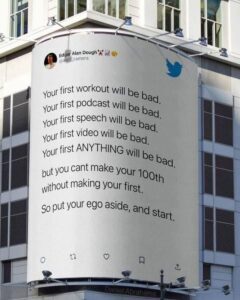
February 4, 2025
Surprise! No phones but great photos!
I made a lot of excellent decisions when planning Elysha’s surprise party.
Preserving the surprise was one of them — probably the most important and most difficult when it comes to pulling off a surprise. Coordinating with a restaurant, vendors, and about 80 guests without your ever-present wife not catching on is not so easy.
Starting the planning six months before the party also helped a lot. A long runway for events like this is critical.
But hiring a photographer turned out to be pretty important, too.
The photographs turned out great. Even better, almost none of the guests had phones out during the party to take photos. At one point, I stood in the center of the room and purposely scanned the guests, and I didn’t see a single phone in a single hand.
I can’t remember the last time I stood in a crowd of people and didn’t see a phone.
Instead of staring at screens, we spent our time in the company of friends and family, celebrating Elysha’s birthday while a professional captured the memories on our behalf.
Here are just a few of the photos taken that night.
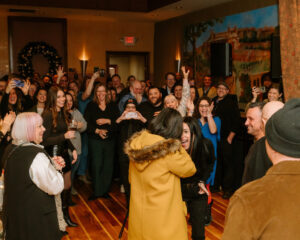
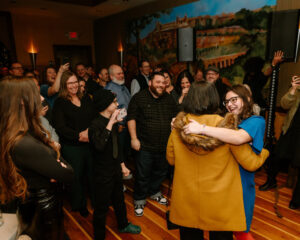






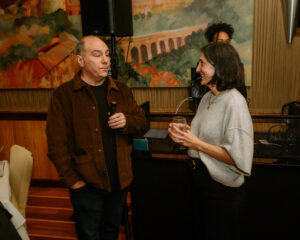
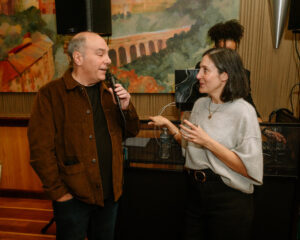
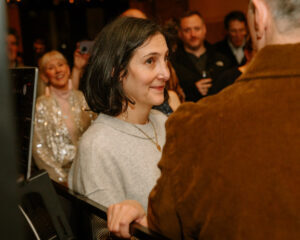



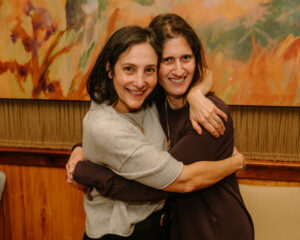





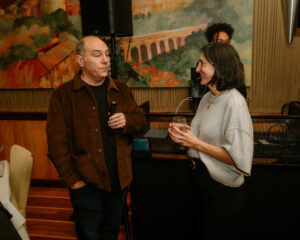
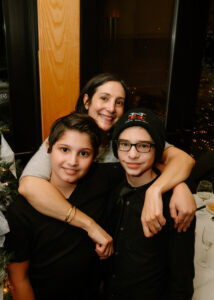

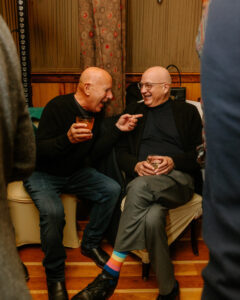

Surprise! No phones but grat photos!
I made a lot of excellent decisions when planning Elysha’s surprise party.
Preserving the surprise was one of them — probably the most important and most difficult when it comes to pulling off a surprise. Coordinating with a restaurant, vendors, and about 80 guests without your ever-present wife not catching on is not so easy.
Starting the planning six months before the party also helped a lot. A long runway for events like this is critical.
But hiring a photographer turned out to be pretty important, too.
The photographs turned out great. Even better, almost none of the guests had phones out during the party to take photos. At one point, I stood in the center of the room and purposely scanned the guests, and I didn’t see a single phone in a single hand.
I can’t remember the last time I stood in a crowd of people and didn’t see a phone.
Instead of staring at screens, we spent our time in the company of friends and family, celebrating Elysha’s birthday while a professional captured the memories on our behalf.
Here are just a few of the photos taken that night.

























February 3, 2025
A perfect dedication
A friend from my McDonald’s managing days sent me this dedication that he found in the book he’s reading:
“For anyone who has ever cried in a walk-in refrigerator.”
This is an author who understands restaurant workers.
I managed McDinald’s restaurants from age 17 through 28, first as a junior in high school, then to support myself when I was kicked out of my home, and later to put myself through college.
I was also fired from the company after being arrested and tried for a crime I didn’t commit, but I quickly found a position with a franchisee who believed in me.
When I moved from Massachusetts to Connecticut, I worked at a McDonald’s in Hartford, Connecticut, managing full-time while attending Manchester Community College, Trinity College, and St. Joseph’s University.
I would work from 4:00 AM until 1:00 PM on Monday, Wednesday, Friday, Saturday, and Sunday.
I would attend classes on Monday, Wednesday, and Friday afternoons and evenings and all day on Tuesday and Thursday.
I also wrote for the school newspaper, competed in statewide debates, served on the student council, and was President of the National Honor Society.
During the last two years of this schedule, my partner, Bengi, and I launched our DJ business.
I don’t know how I did it, except after being jailed, homeless, tried for a crime I didn’t commit, and the victim of a brutal crime, nothing ever seemed so difficult anymore.
When you finally escape constant hopelessness and fear, you can’t wait to start your life.
But all that said… I never cried in the walk-in refrigerator before.
I kissed girls in walk-in refrigerators.
I was asked and agreed to be the stripper for a bachelorette party in a walk-in refrigerator.
I was asked and rejected the offer of sex in a walk-in refrigerator.
I was knocked unconscious after slipping on a wet floor in a walk-in refrigerator.
I was accidentally locked in a walk-in refrigerator for about two hours during an early morning shift before an employee arrived and found me trapped inside.
But I have found many people crying in walk-in refrigerators.
Many were crying because of the stress of the shift.
Some were crying because of a love connection gone awry.
Some were crying because something in life sucked, and a walk-in refrigerator is a private place amongst the tomatoes and radishes to weep where no one will hear you.
If you need to cry, it’s not a bad place to grab a few minutes and spill some tears.
As this author clearly understands.

February 2, 2025
3,700 miles apart
As you probably know, the Atlantic Ocean didn’t always exist.
During the time of the dinosaurs, South America and Africa were joined as one land mass.
About 140 million years ago, they began to drift apart, giving way to the South Atlantic. But before that happened, northeastern Brazil directly linked up with Cameroon along the Gulf of Guinea.
Last summer, a remarkable discovery was made:
Scientists found a matching trail of dinosaur footprints — 260 in all from the Early Cretaceous Period — on either side of the Atlantic that are believed to have once been part of the very same trail.
About 140 million years ago, a dinosaur walked from South America to Africa while they were still connected, and even though the continents eventually divided, the footprints remained.
3,700 miles apart.
Astounding.
Also infuriating.
On the unlikely chance that I someday die, I have been trying like hell for most of my life to leave enough behind to be remembered in some feeble attempt to achieve an imperfect immortality:
Books, stories, magazine columns, solo shows, podcasts… anything and everything I can do to leave my mark on this world.
I went into teaching for many reasons, but one was to create positive ripples in the future by helping the children occupying my classroom.
Death is terrifying to me, but coming in a close second is the idea that I have walked this world and persisted on this mortal coil for decades (and perhaps centuries) only to one day become irrelevant and forgotten.
I can’t even bear the thought.
Then some almost certainly stupid dinosaur manages to achieve the same damn thing — 140 million years worth of imperfect immortality — without even trying.

February 1, 2025
Resolution update: January 2025
Every month, I record my progress on my yearly goals to hold myself accountable and occasionally seek help and advice from readers willing to offer insight, ideas, and solutions.
Here are my results from January.
PERSONAL FITNESS/ATHLETICS1. Don’t die.
Didn’t even come close to death in January.
2. Lose 10 pounds.
I gained a pound. Good job, Matt.
3. Do a targeted push-up workout at least four times per week.
Done.
4. Complete 100 sit-ups four times per week.
Done.
5. Complete three one-minute planks four times a week.
Done.
6. Cycle for at least five days every week.
I completed 22 rides in January — a lower-than-usual number for me. Travel to Florida and a week of consecutive evenings in New York City, Boston, and New Haven kept me off the bike as much as I’d like.
7. Try at least three new vegetables I have never eaten before or do not like.
No progress. I don’t even know what vegetables to try that I’ve never tried before.
8. Get a DEXA Scan and VO2 Max test at least once in 2025.
Local facility identified. Appointment will likely happen in the summer.
9. Lower my handicap to 19.9.
I played one reasonable round of gold while in Florida and two atrocious rounds. It was like I forgot how to play.
I have a new coach, and I will work hard this winter to improve so that I am ready to return to the golf course once the ground thaws.
WRITING CAREER10. Complete my eighth novel.
No progress.
11. Write, edit, and revise my golf memoir.
No progress.
12. Write my “Advice for Kids” book.
I’ve added quite a bit to this book, including new student recommendations, new thoughts of my own, and an actual list and letter written by former students.
13. Write/complete at least three new picture books, including one with a female, non-white protagonist.
No progress.
14. Write about my childhood in partnership with my sister, Kelli, at least once per month.
No progress.
15. Write a new solo show.
Working has begun in earnest.
16. Submit at least three Op-Ed pieces to The New York Times for consideration.
No progress.
17. Write at least four letters to my father.
No progress.
18. Write 150 letters.
A total of 38 letters were written in January to students, former students, clients, the chef of a local restaurant, the server in a local restaurant, storytellers, and others.
19. Write to at least six authors about a book I love.
No progress.
STORYTELLING/SPEAKING CAREER20. Launch a new Homework for Life app.
Excellent progress, thanks largely to my digital wizard partner in this project. I look forward to announcing a beta version of the product soon.
21. Record and publish at least 25 videos to my YouTube channel.
No progress.
22. Perform a new solo show.
Dates have been locked in: May 4 and 5 at TheaterWorks in Hartford.
Save the date!
23. Revise my free Storyworthy Academy.
It’s nearly complete. We need to add a video or two, but I’m happy to report that the free Storyworthy Academy, as it exists online today, is excellent.
24. Record and produce at least three new Storyworthy courses.
We are deciding upon topics now and will begin recording shortly.
25. Produce a total of six Speak Up storytelling events in 2023
Elysha and I produced a sold-out show on January 11 at the Connecticut Museum for History and Culture.
We have another show scheduled for February 7 at District in New Haven.
26. Submit pitches to at least three upcoming TEDx events, hoping to be accepted by one.
No progress.
27. Attend at least eight Moth events with the intention of telling a story.
I attended one Moth StorySLAM in January. Although I couldn’t take the stage, two of my friends and students did, and they told the two best stories of the night.
28. Win at least one Moth StorySLAM.
No progress.
29. Win a Moth GrandSLAM.
No progress.
30. Pitch “You’re a Monster, Matthew Dicks” or my new show to six theaters in 2025.
No progress.
31. Produce at least 24 episodes of our podcast Speak Up Storytelling.
No progress.
32. Perform stand-up at least six times.
I performed stand-up at an open mic at The Elbow Room in West Hartford, CT. It went well.
33. Pitch three stories to This American Life.
No progress.
34. Submit at least three pitches to Marc Maron’s WTF podcast.
No progress.
35. Send a newsletter to readers at least 50 times.
Eight newsletters were sent in January — to both my Storyworthy and Speak Up communities.
HOME36. Organize the basement.
A smidgen of progress. Some additional items have been thrown away.
36. Clear the garage of unwanted items.
Negative progress was made as my family managed to add items to the garage that don’t belong.
37. Replace our backyard shed.
No progress.
38. Get the hardwood floors refinished.
No progress.
FAMILY/FRIENDS39. Travel to Europe.
Waiting on possible tour dates to Australia and Portugal before we finalize European dates.
We’re also traveling to Florida this month and Canada in April, so we must finalize those vacations first.
40. Text or call my brother or sister once per month.
Done. The texts were short and pathetic, but they happened!
41. Bring my brother, sister, and me together at least twice in 2025.
No progress.
42. Take at least one photo of my children every day.
Except for days when I was away and unable to take the photograph, done.

43. Take at least one photo with Elysha and me each week.
I have photos from two of the four weeks, but thanks to hiring a photographer for the surprise party, I have more than four photos of us together.

44. Plan a reunion of the Heavy Metal Playhouse.
No progress.
45. I will not comment positively or negatively on the physical appearance of anyone except my wife and children to reduce the focus on physical appearance in our culture overall.
Done. Piece of cake.
46. Surprise Elysha at least 12 times.
I hosted a surprise birthday party for Elysha on January 4. It will likely be the biggest surprise of the year.
47. Play poker at least six times.
No progress.
48. Spend at least six days with my best friend of more than 30 years.
No progress.
MUSIC49. Memorize the lyrics to at least five favorite songs.
No progress.
50. Practice the flute at least four times per week.
No progress. I’m an idiot.
MISCELLANEOUS PROJECTS51. Host at least three dinner parties where I cook.
No progress.
52. Develop a course on self-confidence.
Excellent progress. Strategies are being collected, an instructional outline is being developed, and I’m interviewing people for thoughts and ideas.
53. Develop a list of strategies to help people deal with loneliness and produce it in some form.
Excellent progress. I am collecting strategies and talking to many people about their possible efficacy and any additional ideas.
54. Read at least 12 books.
I read four books in January:
“Unreasonable Hospitality” by Will Guidara
“Schtick to Business” by Pete McGraw
”The Humor Code” by Pete McGraw
“Catching the Big Fish” by David Lynch
I’m currently reading:
”Miracle and Wonder” by Bruce Headlam and Malcolm Gladwell
“Simply Said” by Jay Sullivan
55. Finish reading TIME’s 100 Best Children’s Books of All Time.
Progress! I read five books in January, bringing my total to 44 total books read off the list.
56. Edit our wedding footage into a movie of the day.
”Miracle and Wonder” by Bruce Headlam and Malcolm Gladwell
57. Digitize a pile of DVDs that contain dance recitals, plays, and other assorted moments from the past.
I’ve assembled the material. It is sitting in an annoying pile on my desk.
58. Memorize three new poems.
I have memorized (and can sign) “This is Just to Say” by William Carlos Williams.
59. Post my progress regarding these resolutions on this blog and social media on the first day of every month.
Done.
January 31, 2025
I had a cavity filled and was shocked by the procedure.
I had a cavity, which is crazy. I didn’t know adults could get cavities.
I brush my teeth two and sometimes three times a day, and I’ve flossed every single day of my life for more than two decades.
Yet, somehow, I got a cavity.
My dentist explained that the cavity formed in a narrow groove of a tooth that was especially hard to keep clean, which left me wondering why she hadn’t warned me about this narrow groove before.
I would’ve tried harder to keep it clean.
Nevertheless, I had a cavity, which meant I had to return to the visit for a process involving needles and drills in my mouth.
I dreaded this appointment for more than a week. I considered canceling or rescheduling for sometime in late 2029.
But instead, I decided to go.
While sitting in the chair, I explained my fear of needles to the dentist and hygenist:
A near-death experience after being stung by a bee at the age of 12 led to dozens of needles over the course of a week that left me terrified of shots of any kind.
A negative feedback loop, I’ve been told. Hard-wired into my brain.
I’m better about needles today, but I’m still not great, and a needle in my mouth is especially terrifying.
The dentist and hygienist were patient and kind and promised to make this process as simple and painless as possible.
“Sure,” I thought. “Like that’s going to happen.”
Then it did.
Some numbing gel applied to the site of the injection made the needle completely pain-free. I closed my eyes as they began the procedure and didn’t even know that the injection had happened.
“It’s done?” I said. “You did the novocaine shot?”
“Yup,” she said. “We’ll just wait a few minutes for it to numb.”
I couldn’t believe it.
Shortly thereafter, the drilling began. It started with safety goggles — something I had never worn as a child when I had a cavity filled— and warnings that if I needed a break or things became too uncomfortable, I should just raise my hand, and they would stop.
I braced myself for the drill, and then I felt nothing. Other than the sound of drilling and a slight vibration in my head, it was better than painless:
It was nothing. No sensation whatsoever.
I couldn’t believe it again.
Apparently, dentistry in the 1980s was barbaric compared to today. What was once a painful and awful process has become a nothing-burger four decades later.
The same thing happened with root canals. After having my bottom row of teeth knocked out during a head-on collision that sent my head through a windshield, two of my teeth — re-rooted by dental surgeons after the accident — have required a root canal.
The first procedure, back in 1992, was barbaric. A two-day process that was painful beyond imagination. Purposely painful, in fact, to ensure that the dentist was hitting the nerve.
“Tell me when it hurts,” he would say again and again and again.
The second root canal, done a day after my honeymoon in 2006, was completely pain-free and done in less than 30 minutes.
I hugged the dentist when we were done. I couldn’t believe it.
It’s easy to forget how far we’ve come. Two previously painful and frightening procedures have now become pain-free and almost carefree.
Amazing.
It’s also easy to think we’ve reached some near-pinnacle of medicine and technology, failing to realize that someday in the future, human beings will look at the medicine and dentistry of today in the same way we look back on the medicine and dentistry of a century or more ago as horrific, ridiculous, and utterly unscientific.
We’re always living in the stupidity and barbarism of the future. Future generations will inevitably look at how we lived as incomprehensible and disastrous.
But I’m happy to report it’s at least a little less barbaric than it once was, and for that, I am so very grateful.

January 30, 2025
Chalk up one for America’s public servants
If you’re paying even minor attention to the news these days, you may find it deeply unsettling.
Even if you voted for Trump, you must know in a place you perhaps won’t admit even to yourself that the first few days of this administration have been a disaster.
Amongst the parade of idiots and monsters taking positions in the federal government include:
An anti-vaccination Cabinet nominee for Health and Human Services who has claimed that chicken soup is the best cure for measles, Wi-Fi exposure causes “leaky brain” and brain damage (two separate things), COVID was genetically engineered to target blacks and whites (but spare Ashkenazi Jews and Chinese people), and pesticides cause children to become gay and transgender.
And that’s just the tip of the RFK iceberg. I haven’t even mentioned the blender full of baby chickens and mice, the brain worm, and the ursine roadkill stuffed into the trunk of his car.
We also have a nominee for Defense Secretary nominee who has a history of drinking problems, serial adultery, paying hush money to women who have accused him of sexual harassment and assault, and running companies into bankruptcy.
Except for the drinking, he actually sounds a lot like Trump.
And then, yesterday, Trump’s sweeping freeze on trillions in federal spending for grants and loans caused Meals on Wheels to shut down, threatened school lunch programs, closed Medicare’s online portals, shuttered Head Start programs, sidelined important research into technology and medicine, and had many other disastrous results.
It is just the kind of thing the Trump administration likes:
Ending food assistance to children and the elderly.
Preventing older Americans from accessing their healthcare.
Closing preschools.
Ending research into things like cancer, heart disease, and Alzheimer’s.
Even the pathetic, subservient Republican members of Congress objected.
Eventually, a judge ended the freeze, and Trump backed down.
It’s not been a glorious start to Trump’s second term.
But I am here to report some good news:
Remember the murder hornets?
Amid the pandemic and lockdown came news of murder hornets — insects the size of garbage trucks — killing pollinating bees and threatening the future of American agriculture.
Not to mention scaring the bejeezus out of many of us.
I’m happy to report that murder hornets are no more.
State and federal officials — the same public servants and scientific experts the Trump administration despises — have successfully eradicated murder hornets from the United States.
We won!
Five years after first being spotted, all nests of murder hornets have been destroyed, and no trace of the insects has been found inside our borders.
It’s an accomplishment of multiple levels of government working in concert to attack a serious problem that could have threatened food supplies in the United States.
It is just the kind of thing that good government can do for the American people when it isn’t marginalized, maligned, and eroded by the very people charged with protecting and preserving our institutions.
Just a little good news amid Trump’s current trainwreck.
As Mr. Roger’s famously said:
“Look for the helpers. You will always find people who are helping.”
Even when the news is filled with narcissists, sycophants, and idiots.




